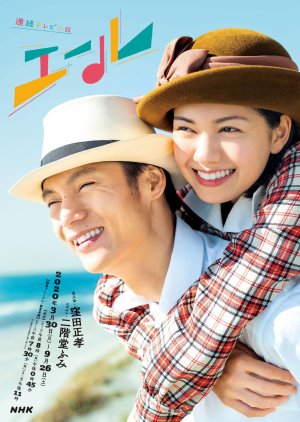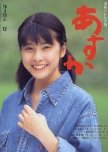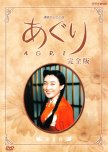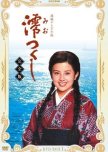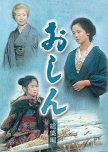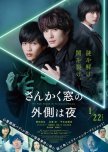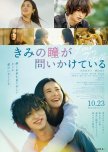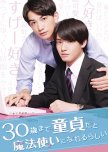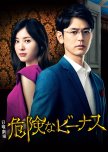
A Love Story Between Two Musicians
Yell is the story of Yuichi and Oto who managed to meet, fall in love and marry at a time in Japanese history when most marriages were arranged. The series is a relatively faithful biography of the composer Koseki Yuji whose music is showcased throughout. (There is a one-week arc where the series cheerfully veers into the paranormal, and the historicity of that particular week may be in doubt.) The series follows Yuichi from his childhood where he was bullied for having a stutter through to a happy retirement following a long and successful career in the music industry making hit songs in the pre-war era, writing propaganda songs during the war, and composing the music for radio serials, film and stage productions after the war. Kubota Masataka plays this mild and gentle soul from high school through retirement.Yuichi's soulmate is Oto, the second daughter of a Christian family who had a small business making saddles. She encounters a famous operatic soprano when she is young and decides to become an opera singer. Oto is played by Nikaido Fumi whose voice is surprisingly convincing in the role.
The focus of this series is centered more on Yuichi than Oto mostly because the roles of wives and mothers were comparatively limited in early to mid century Japan, and so there are fewer family anecdotes about her to be incorporated into the series once they settled down and had their daughter Hana. Nevertheless, the show is pretty balanced between the two characters until the war when Yuichi's stories tend to dominate. There are also many lovely side stories involving the couple's siblings, friends and daughter.
The height of this series is Yuichi's involvement in the war. Yuichi proudly writes music for the war effort until late in the war when he makes a fateful morale trip near the front lines in Burma where he is confronted with the consequences of his support of the war - to the point that he stops composing for a period, and eventually writes a now beloved and haunting song for peace. The script really does not pull any punches in its portrayal of wartime Japan , showing the country's military fervor and its dire consequences, and this section of the series is quite moving.
Other than the war years, the tone of the series is pretty light with the dramatic obstacles being those usually associated with trying to establish oneself in the music industry and the expected parental objection to the match of Yuichi and Oto. The series was in production when the pandemic hit and for the first time in decades NHK had to put its asadora on hiatus for a few weeks. I don't think that the hiatus had any noticeable effect on the quality or the story, but the series ended up slightly shorter at 24 weeks instead of 26. A bigger impact on the length of the series arose from the decision to move from six episodes per week down to five, but I believe that decision was made prior to the pandemic and will remain true for the asadoras from Yell on. Thus, Yell has 120 episodes when prior asadora typically had 156.
Yell is an above average asadora with a few a particularly stellar weeks. The last week is a bit of a hodgepodge trying to complete a final romantic arc, doing the final payoff to a setup in Ep. 1, and building to a fanciful denouement in Ep. 119 to match the unusual opening scenes of the series. Ep. 120 is a final concert of Koseki's music with Nikaido concluding the series with a lovely performance of The Bells of Nagasaki.
Considerați utilă această recenzie?

Această recenzie poate conține spoilere
"Let's send a cheering yell!"
"Yell" is my 20th asadora and it's the third I've completed from this decade. It was also a great way to kick off 2020 and they made a great drama, despite all of the COVID-19 issues."Yell" is what I like to call a "couple asadora." I've seen a few of these couple-focused ones and the problem is normally that they become uneven at some point. For example in "Manpuku," the attention shifts to the husband and the wife becomes less important. In "Yell," the attention feels more equal. Yuichi (played by Kubota Masataka) and Oto (Nikaido Fumi) each have their own childhood weeks and both have dreams. I think Yuichi is obviously the "main" main character, but Oto never vanishes into the background. She remains important to the narrative from start to finish.
I previously watched Kubota Masataka in "Hanako to Anne" and I was delighted to see that he had his own asadora. He plays the composer Yuichi with a lot a nuance. Kubota and Nikaido Fumi have really good chemistry together, which accounts for nearly all of the charm of this asadora. Nikaido, who plays the aspiring singer Oto, also has a really great singing voice. I loved every moment that she was singing. I wish the narrative had let Oto realize her dreams, but I feel that the character has a very fulfilling life nevertheless.
Like most asadoras, "Yell" has a lot of great side characters. However, unlike some, "Yell" gives a lot of these characters arcs and storylines that [for the most part] are given satisfying conclusions. I'll name a few that were stand-outs to me. There's Yuichi's childhood friends, Sato Hisashi (Yamazaki Ikusaburo) and Murano Tetsuo (Nakamura Aoi), an aspiring singer and lyricist. Both are given strong characterization and great storylines, which brought me to tears. Yuichi's and Oto's daughter, Hana (Furukawa Kotone), also sticks out to me. She has a likeable, realistic personality, which makes her one of the few children of asadora characters not to annoy me (lol). Oto's and Yoichi's family have quite a bit of storyline as well with their own fun romances. And there's a lot of reoccurring characters that populate the asadora, which are delightful whenever they're on your screen.
Okay, now on to the very few issues I had while watching. The twelfth week of "Yell" was a very obvious filler week as it consisted only of side stories of characters that we really didn't need to see. [I wonder if this week was made because of COVID?] I disliked seeing Oto's father as a ghost. For an asadora that had so much realism, it was just a weird juxtaposition. Also, after Yoichi is finally successful as a composer, his storyline becomes a bit on the boring side. Thankfully, it does pick up around the WWII weeks. Lastly, I'm tired of asadora heroines giving up their careers because they're pregnant. It's probably true to life [and let's face it, realistic], but it becomes annoying after so many times (lol).
Finally, I want to conclude this review on a positive note. "Yell" is very different from other asadoras. It has a unique opening and ending. The first episode is absolutely perfect, honestly. The last episode is technically a special concert episode, which was a really fun way to go out (though not necessary to watch). The last moment of the asadora narratively (episode 119) is such a sweet way to conclude and will remain in my memories for a long time to come. The music is impeccable and the talent of the entire cast is obvious. I definitely recommend "Yell", despite the few narrative flubs.
Considerați utilă această recenzie?

Considerați utilă această recenzie?

